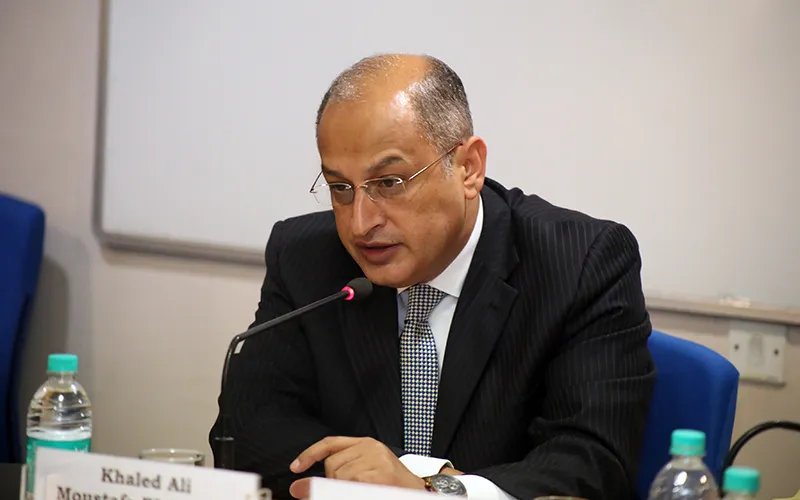During a discussion on the critical phase of the post-revolutionary period in the Egyptian political system and society, a major part was focused on the nature of demands the discontented Egyptians had when they took to the streets in 2011.

Egypt, a country defined by the several identities it wears at a time - Arab, African as well as Mediterranean- never ceases to be in the news. There have been significant political developments in Egypt since the ouster of Hosni Mubarak in the 2011 revolution, which is being observed in India with great interest. Ambassador of the Arab Republic of Egypt to India, Mr. Khaled Ali Moustafa El-Bakly, spoke to the faculty of Observer Research Foundation on the recent developments in Egypt on the 18 December 2013. He discussed the key features of the new constitution which will be put to vote later in January.
The central point of discussion was the critical phase of the post-revolutionary period that the Egyptian political system and the Egyptian society are undergoing, after Egypt’s first democratically elected President in more than three decades, Mr. Mohamed Morsi, was deposed from office. The key features of the new Constitution, to be put to vote in a referendum in January, were also examined. Egypt’s foreign policy, hitherto divorced from public opinion for many years, was reflected on. It was remarked, in particular, that Egypt’s robust relationship with the United States, which was one of the pillars of the Egyptian foreign policy during Mubarak’s regime, is now under strain.
A major part of the discussion focused on the nature of demands the discontented Egyptians had when they took to the streets in 2011. The principal demands -- like more political freedom; declaration of President Mubarak’s and his son’s commitment not to run for the presidency in the upcoming election; abolition of the Emergency Law; social justice and better distribution of wealth and resources of the country; combating corruption in public institutions; creating more jobs; and restoring stability in the country to attract investments -- went unheeded. Buckling under pressure, President Mubarak stepped down and handed over power to the Army, which ruled for a year until the country had its first elected government in over three decades.
The discussion also touched on the causes of the crisis Egypt is currently going through - a divisive Constitution; a President who aimed to be all-powerful; and a deteriorating economic situation. The timing of the elections that brought the Muslim Brotherhood - the only organised entity during elections in Egypt, other than the armed forces- was questioned. It was pointed out that the Brotherhood, once into power, started working on an Islamist-oriented Constitution. Other political parties were not called for discussions. The principles of Sharia were proclaimed as the main source of legislation in Egypt. The constitution was also called sectarian in character, as one provision called for the application of only those principles of Sharia law, which are accepted in Sunni doctrines.
It was opined during the discussion that the referendum on the controversial 2012 constitution, which was won by Morsi’s Muslim Brotherhood, further polarised the country into the ultra-conservatives, including Morsi’s Muslim Brotherhood and its supporters on one hand and the liberal and secular parties and youth groups on the other.
The discussion also examined the measures that the interim government, headed by General Al- Sisi, nominated President, has taken to implement a successful transition to democracy.
In response to the scepticism as to whether Egypt was moving towards a long-term military rule again, the audience was informed about the roadmap adopted by a wide section of the Egyptian society, including the political parties, civil society, representatives of the religious institutions, union members, intellectuals and public figures.
Furthermore, the new draft Constitution, which has been prepared by a 10-member Legal experts Committee consisting of civil society, legal experts, artists, religious entities to have a wide exchange of ideas, was discussed at length. Among the key amendments, those analysed during the discussion were -- restoring the marriageable age for girls to 18 years from 9 years; guaranteeing more rights to the child; prohibition on religious, sectarian, racial parties from contesting in elections so as to ensure a water-tight separation between religion and state; granting women the right to be appointed in judicial institutions and public offices and guaranteeing them adequate representation in the legislative bodies; prohibition on all kinds of oppression, including human trafficking; more independence to the judiciary and the military. The new draft constitution also includes, for the first time, a separate section on culture, and requires the state to safeguard Egyptian antiquities against theft and destruction.
(This report was prepared by Garima Sahdev, Research Intern, Observer Research Foundation, Delhi)
The views expressed above belong to the author(s). ORF research and analyses now available on Telegram! Click here to access our curated content — blogs, longforms and interviews.




 PREV
PREV

